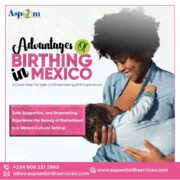Advantages of Birthing in Mexico
Birthing in Mexico also presents potential advantages in terms of citizenship for the child and benefits for both parents and grandparents:
1. Citizenship for the child: In Mexico, children born on Mexican soil are generally granted Mexican citizenship by birthright. which is recognized under the principle of jus soli, or “right of the soil.” This means that children born in Mexico, regardless of the nationality of their parents, are automatically considered Mexican citizens. This citizenship can provide the child with various rights and opportunities, including access to education, healthcare, social services, and the ability to live and work in Mexico without restrictions. Additionally, Mexican citizenship may serve as a valuable asset for the child in the future, offering them the option to pursue higher education, employment, or residency in Mexico or other countries that have favorable relations with Mexico.
i. Advantages for parents: For parents, having a child born in Mexico can offer strategic advantages, particularly if they wish to establish ties to the country or explore opportunities for residency or citizenship themselves. In some cases, the birth of a child in Mexico may facilitate the process of obtaining legal residency or citizenship for the parents, especially if they meet certain eligibility criteria or pursue specific immigration pathways available to parents of Mexican citizens. Additionally, having a child with Mexican citizenship can provide parents with peace of mind and a sense of security, knowing that their child has access to the rights and benefits associated with Mexican nationality.
ii. Benefits for grandparents: The birth of a grandchild in Mexico can also have positive implications for grandparents, especially if they have aspirations of spending time with their grandchild in Mexico or establishing stronger family connections across borders. Grandparents may find joy and fulfillment in being involved in the upbringing of their Mexican born grandchild, fostering intergenerational bonds and cultural exchange. Additionally, the presence of a grandchild with Mexican citizenship can open up opportunities for grandparents to visit or reside in Mexico more easily, whether for short-term visits, extended stays, or retirement. Overall, the birth of a grandchild in Mexico can enrich the lives of grandparents by expanding their familial ties and experiences in meaningful ways.
2. Cost-effective healthcare: Mexico offers relatively lower healthcare costs compared to many developed countries. This affordability extends to childbirth-related expenses, including prenatal care, delivery, and postnatal care. Hospitals and clinics in Mexico typically provide quality services at a fraction of the cost seen in countries like the United States or Canada. This makes birthing in Mexico an attractive option for individuals seeking high quality care without the financial burden often associated with childbirth in other countries.
3. Quality healthcare facilities: Mexico has made significant investments in its healthcare infrastructure, resulting in modern hospitals and clinicsequipped with state-of-the-art medical technology. These facilities adhere to international standards of care and hygiene, ensuring a safe and comfortable environment for expectant mothers and newborns. Whether in urban centers or rural areas, mothers can access well-equipped healthcare facilities staffed by competent medical professionals.
4. Cultural and linguistic familiarity: For individuals with ties to Mexican culture or who speak Spanish, birthing in Mexico offers a culturally and linguistically familiar experience. This familiarity can contribute to a sense of comfort and ease during the childbirth process, as patients can communicate effectively with healthcare providers and navigate cultural norms and practices more seamlessly. Additionally, healthcare professionals in Mexico are often trained to provide culturally sensitive care, further enhancing the patient experience.
5. Access to experienced healthcare professionals: Mexico boasts a robust healthcare workforce, including skilled obstetricians, midwives, nurses, and other specialists trained in maternal and newborn care. These professionals have experience managing a wide range of childbirth scenarios and are adept at providing comprehensive prenatal, delivery, and postnatal care. Whether opting for a hospital birth, a birthing center, or a home birth attended by a midwife, mothers in Mexico can access the expertise of qualified healthcare professionals.
6. Options for natural childbirth: Many healthcare facilities in Mexico support a holistic approach to childbirth, offering options for natural childbirth methods such as water births, midwife-assisted deliveries, and non-medicated pain management techniques. These facilities prioritize maternal autonomy and patient centered care, empowering mothers to make informed decisions about their birthing experience. By offering a range of birthing options, Mexico accommodates diverse preferences and promotes maternal well-being.
7. Family-centered care: Mexican hospitals and birthing centers often embrace a family centered approach to childbirth, encouraging the involvement of partners, family members, and loved ones throughout the birthing process. This inclusive approach allows for emotional support, bonding, and shared decision-making, enriching the childbirth experience for both mothers and their support networks. By fostering a sense of unity and collaboration, family-centered care contributes to positive birth outcomes and enhances the overall birthing experience.
In summary, birthing in Mexico offers a combination of affordability, quality healthcare facilities, cultural familiarity, access to experienced professionals, options for natural childbirth, and family centered care. These factor make Mexico an attractive destination for expectant mothers seeking personalized, holistic, and empowering birthing experiences.


